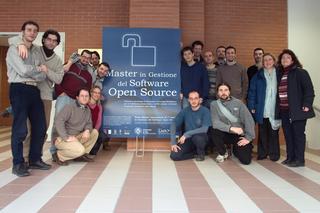Italy is making open source software (OSS) a new academic discipline. Together with an Italian open source solution company, Net7, the Universitá di Pisa has organized a master course on the subject. The aim is to train OSS managers, who will facilitate the dissemination of OSS in IT industries and public administration, after finishing their studies. There is a demand for OSS managers within Italian companies and public offices, and the course is anticipated to bridge the human resources gap.
The syllabus is divided into four main subjects: computer science, business, law and the political aspects of OSS. As one of the course coordinators, Dr. Simone Montangero, reports: “We are training new managers, not only software developers. The students attending the course come from a wide range of disciplines including computer science, social science and economy.” To acquire hands-on experience, students are asked to spend three months in corporations and public administration for a stage project.

The first course started September 2004. Unfortunately, of the 18 students only two are women. The next course will begin this autumn. Another master course on open source software with a stronger technical focus is available at the Universitá di Bologna.
